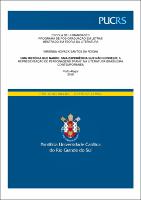| Share record |


|
Please use this identifier to cite or link to this item:
https://tede2.pucrs.br/tede2/handle/tede/8310| Document type: | Dissertação |
| Title: | Uma história que narro; uma experiência que não conheço : a representação de personagens trans* na literatura brasileira contemporânea |
| Author: | Rocha, Virgínea Novack Santos da  |
| Advisor: | Amodeo, Maria Tereza |
| Abstract (native): | A partir das reflexões contemporâneas sobre gênero, em especial, sobre a transexualidade, o objetivo dessa reflexão foi o de tentar estabelecer algumas relações entre estas temáticas e a literatura brasileira contemporânea. Para isso, efetuou-se uma análise crítica e comparatista das narrativas Do fundo do poço se vê a lua, Joca Reiners Terron (2010); Sérgio Y vai à América, Alexandre Vidal Porto (2014) e As fantasias eletivas, de Carlos Henrique Schroeder (2016), uma vez que todas elas apresenta uma personagem trans* (respectivamente Cleo, Sandra e Copi). Assim, observou-se que todas as narrativas apresentam uma mesma lógica de organização da vida, isto é, um ciclo da vida diretamente relacionados a identidade de gênero das personagens. A saber: uma estrutura familiar que silencia e/ou exclui a criança, uma necessidade de deslocamento geográfico e a morte prematura. Nesse sentido, para empenhar tal reflexão, partimos dos conceitos de performatividade de Butler (2016) e plasticidade do gênero Preciado (2014) para compreender os mecanismos de reiteração discursivas do gênero bem como a possibilidade de contraproduzi-los por meio do rompimento com os limites sobre a “verdade” dos corpos. Além disso, importantes contribuições foram também as de Jesus (2013 e 2014a) e Vergueirro (2016), ao situar as questões de gênero no âmbito do transfemino, as pesquisadoras teorizam sobre a estrutura de poder que sujeita as identidade trans* em nossa sociedade: a cisnormatividade. Dessa forma, foi possível concluir nas três narrativas existem alusões as identidades das personagens enquanto falsidade, artificialidade e cópia. Cleo é uma mulher trans* que busca construir enquanto usurpação de identidades femininas estereotipas pelo cinema; Sandra é uma mulher trans* consciente de si além de ter uma excelente condição financeira, mas que acaba tendo o mesmo destino das outras personagens, o que, porém, é tratado sob o signo do casualidade. Por fim, Copi é uma grande representante da realidade de muitas travestis brasileiras, uma vez que é relegada ao abandono e a solidão. No entanto, sua identidade também é atrelada a atuação, mentira e falsidade |
| Abstract (english): | Based on the contemporary reflections on gender, especially on transsexuality, the purpose of this reflection is to try to establish some relations between these themes and contemporary Brazilian literature. For this, it is performed a critical and a comparative analysis of the narratives. Do fundo do poço se vê a lua, by Joca Reiners Terron (2010); Sérgio Y vai à América, by Alexandre Vidal Porto (2014), and Carlos Henrique Schroeder's As fantasias eletivas (2016), since they all feature a trans * character (respectively Cleo, Sandra and Copi). Thus, it is observed that all narratives presents the same logic of life organization, that is, a cycle of life directly related to the gender identity of the characters. Namely: a family structure that silences and/or excludes the child, a need for geographical displacement and premature death. In this sense, in order to engage in such reflection, we start with Butler's (2016) concept of performativity and Preciado‟s (2014) concept of plasticity of the genre, in order to understand the mechanisms of discursive reiteration of the genre as well as the possibility of counterproduction by half of the break with the limits on the "truth" of bodies. In addition, important contributions are also those of Jesus (2013 and 2014a) and Vergueiro (2016), situating the gender issues in the context of transfeminism, the researchers theorize about the power structure that subjects the trans* identity in our society: the cisnormativity. Thus, it was possible to conclude that in the three narratives there are allusions to the identities of the characters as falsehood, artificiality and copy. Cleo is a trans* woman who tries to build herself up as a usurpation of female stereotypical identities by the cinema; Sandra is a self-conscious woman besides having an excellent financial condition, but ends up having the same fate as the other characters, which, however, is treated under the sign of chance. Finally, Copi is a great representative of the reality of many Brazilian transvestites, since she is relegated to abandonment and solitude. However, their identities are also tied to acting, lies and falsehood. |
| Keywords: | Transexualidade Personagem Trans* Literatura Criação |
| CNPQ Knowledge Areas: | LINGUISTICA, LETRAS E ARTES::LETRAS |
| Language: | por |
| Country: | Brasil |
| Publisher: | Pontifícia Universidade Católica do Rio Grande do Sul |
| Institution Acronym: | PUCRS |
| Department: | Escola de Humanidades |
| Program: | Programa de Pós-Graduação em Letras |
| Access type: | Acesso Aberto |
| Fulltext access restriction: | Trabalho não apresenta restrição para publicação |
| URI: | http://tede2.pucrs.br/tede2/handle/tede/8310 |
| Issue Date: | 25-Jan-2018 |
| Appears in Collections: | Programa de Pós-Graduação em Letras |
Files in This Item:
| File | Description | Size | Format | |
|---|---|---|---|---|
| Dissertação Virgínea Novack Santos Da Rocha.pdf | VIRGINEA_NOVACK_SANTOS_DA_ROCHA_DIS | 979.75 kB | Adobe PDF |  Download/Open Preview |
Items in DSpace are protected by copyright, with all rights reserved, unless otherwise indicated.




